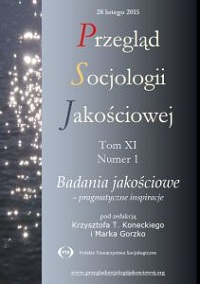Does Grounded Theory Needed to be Rediscovered? Review Essay
DOI:
https://doi.org/10.18778/1733-8069.11.1.04Keywords:
The Discovery of Grounded Theory by B. Glaser and A. Strauss, methodology of grounded theory, traditional grounded theory, constructivist grounded theory, sociological imaginationAbstract
The paper provides an overview of the book Rediscovering Grounded Theory (2014) by Barry Gibson and John Hartman on the background of discussions within the grounded theory methodology. Particular attention is devoted to the reconstruction of the “original version” of grounded theory made by the authors and how this methodology is related to sociological imagination. The paper also briefly presents Gibson and Hartman’s discussion on the main assumptions of constructivist grounded theory.
Downloads
References
Blumer Herbert (2007) Interakcjonizm symboliczny. Przełożyła Grażyna Woroniecka. Kraków: Zakład Wydawniczy Nomos.
Google Scholar
Bryant Antony, Charmaz Kathy (2007a) Introduction. Grounded Theory Research: Methods and Practices [w:] Bryant Antony, Kathy Charmaz, eds., The SAGE Handbook of Grounded Theory. Los Angeles, London, New Delhi, Singapore: Sage, s. 1‒28.
Google Scholar
Bryant Antony, Charmaz Kathy (2007b) The SAGE Handbook of Grounded Theory. Los Angeles, London, New Delhi, Singapore: Sage.
Google Scholar
DOI: https://doi.org/10.4135/9781848607941
Charmaz Kathy (2000) Grounded Theory: Objectivist and Constructivist Methods [w:] Yvonne Lincoln, Norman K. Denzin, eds., Handbook of Qualitative Research. Thousand Oaks: Sage, s. 509–535.
Google Scholar
Charmaz Kathy (2009) Teoria ugruntowana: Praktyczny przewodnik po analizie jakościowej. Przełożyła Barbara Komorowska. Warszawa: Wydawnictwo Naukowe PWN.
Google Scholar
Clarke Adele E. (2005) Situational Analysis: Grounded Theory After the Postmodern Turn. Thousand Oaks, London, New Delhi: Sage.
Google Scholar
Corbin Juliet, Strauss Anselm L. (2008) Basics of Qualitative Research: Techniques and Procedures for Developing Grounded Theory. Los Angeles, London, New Delhi, Singapore: Sage.
Google Scholar
DOI: https://doi.org/10.4135/9781452230153
Denzin Norman K. (2007) Grounded Theory and the Politics of Interpretation [w:] Antony Bryant, Kathy Charmaz, eds., The SAGE Handbook of Grounded Theory. Los Angeles, London, New Delhi, Singapore: Sage, s. 454‒471.
Google Scholar
DOI: https://doi.org/10.4135/9781848607941.n21
Dey Ian (1999) Grounding Grounded Theory. Guidelines for Qualitative Inquiry. San Diego: Academic Press.
Google Scholar
DOI: https://doi.org/10.1016/B978-012214640-4/50011-5
Gibson Barry, Hartman Jan (2014) Rediscovering Grounded Theory. Los Angeles, London, New Delhi, Singapore. Washington: Sage.
Google Scholar
Glaser Barney G. (1978) Theoretical Sensitivity: Advances in the Methodology of Grounded Theory. Mill Valley: Sociology Press.
Google Scholar
Glaser Barney G. (2002) Constructivist Grounded Theory? „Forum: Qualitative Social Research”, t. 3, no. 3 [dostęp 15 sierpnia 2014 r.]. Dostępny w Internecie http://www.qualitative-research.net/index.php/fqs/article/view/825
Google Scholar
Glaser Barney G., Strauss Anselm L. (1965) Awareness of Dying. Chicago: Aldine de Gruyter.
Google Scholar
Glaser Barney G., Strauss Anselm L. (1967) The Discovery of Grounded Theory: Strategies for Qualitative Research. New York: Aldine de Gruyter.
Google Scholar
DOI: https://doi.org/10.1097/00006199-196807000-00014
Glaser Barney G., Strauss Anselm L. (1968) Time for Dying. Chicago: Aldine de Gruyter.
Google Scholar
DOI: https://doi.org/10.1097/00000446-196812000-00048
Glaser Barney G., Strauss Anselm L. (1971) Status Passage. Mill Valley: Sociology Press.
Google Scholar
Glaser Barney G., Strauss Anselm L. (2009) Odkrywanie teorii ugruntowanej: Strategie badania jakościowego. Przełożył Marek Gorzko. Kraków: Zakład Wydawniczy Nomos.
Google Scholar
Gorzko Marek (2008) Procedury i emergencja: o metodologii klasycznych odmian teorii ugruntowanej. Szczecin: Wydawnictwo Uniwersytetu Szczecińskiego.
Google Scholar
Gorzko Marek (2009) Wprowadzenie do wydania polskiego. Przeciw „weryfikatorom”: Projekt metodologiczny „Odkrywania teorii ugruntowanej B. Glasera i A. Straussa” [w:] Barney G. Glaser, Anselm L. Strauss Odkrywanie teorii ugruntowanej: Strategie badania jakościowego. Kraków: Zakład Wydawniczy Nomos, s. XXXI–XL.
Google Scholar
Gorzko Marek (2010) „Drugie pokolenie” teoretyków Grounded Theory. „Studia Sociologica”, nr 20, s. 27‒43 [dostęp 28 stycznia 2015 r.]. Dostępny w Internecie http://usfiles.us.szc.pl/pliki/plik_1326813161.pdf
Google Scholar
Hammond Phillip (1964) Sociologists at Work. Essays on the Craft of Social Research. New York: Basic Books.
Google Scholar
Hood Jane C. (2007) Orthodoxy vs. Power: The Defining Traits of Grounded Theory [w:] Bryant Antony, Kathy Charmaz, eds., The SAGE Handbook of Grounded Theory. Los Angeles, London, New Delhi, Singapore: Sage, s. 149‒164.
Google Scholar
Konecki Krzysztof T. (2012) Wizualna teoria ugruntowana. Podstawowe zasady i procedury. „Przegląd Socjologii Jakościowej”, t. 8, nr 1, s. 12–45 [dostęp 28 stycznia 2015 r.]. Dostępny w Internecie http://www.qualitativesociologyreview.org/PL/Volume18/PSJ_8_1_Konecki.pdf
Google Scholar
Lofland John i in. (2006) Analyzing Social Setting: A Guide to Qualitative Observation and Analysis. Belmont: Wadsworth/Thomson Learning.
Google Scholar
Marciniak Łukasz (2012) Deskryptywna teoria ugruntowana, Klasyczna teoria ugruntowana, Konstruktywistyczna teoria ugruntowana [w:] Krzysztof T. Konecki, Piotr Chomczyński, red., Słownik socjologii jakościowej. Warszawa: Difin, s. 53–56; 127–130; 137–140.
Google Scholar
Strauss Anselm L., Corbin Juliet (1990) Basics of Qualitative Research: Grounded Theory Procedures and Techniques. Thousand Oaks: Sage.
Google Scholar
Timmermans Stefan, Tavory Iddo (2007) Advancing Ethnographic Research through Grounded Theory Practice [w:] Antony Bryant, Kathy Charmaz, eds., The SAGE Handbook of Grounded Theory. Los Angeles, London, New Delhi, Singapore: Sage, s. 492‒512.
Google Scholar
Downloads
Published
How to Cite
Issue
Section
License

This work is licensed under a Creative Commons Attribution-NonCommercial-NoDerivatives 4.0 International License.














